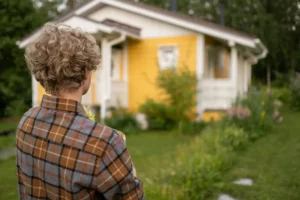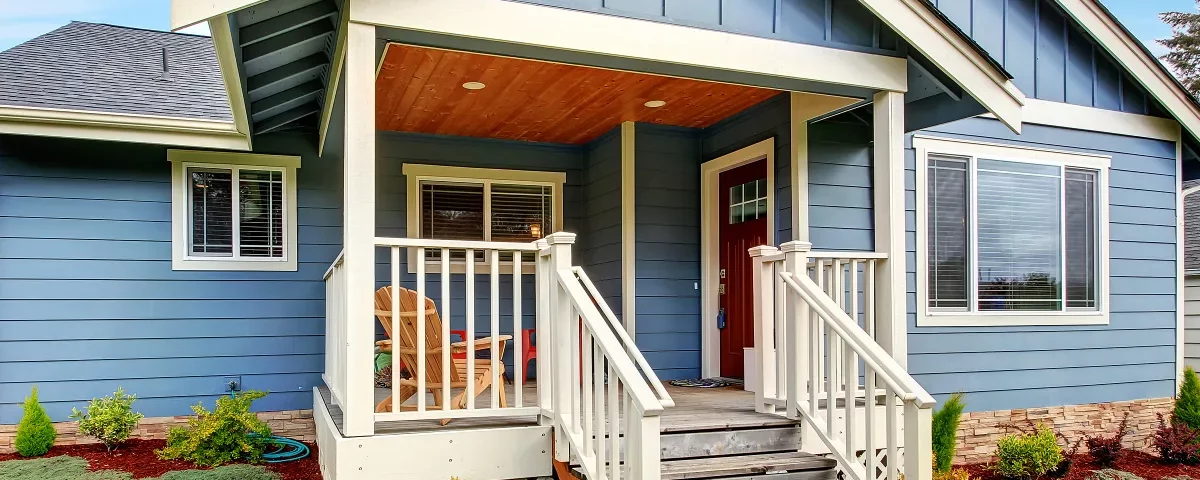My mom and stepdad used my inheritance to buy a house for themselves. They thought I’d stay quiet until I exposed them in front of everyone.
I’m Ian. I’m 17, and I live in a house that no longer feels like home. It used to, back when my dad was alive, and it was just him and me, and everything felt solid.
Now, I wake up every day to the sound of my stepdad humming in the hallway like he built this place from scratch. My mom barely looks at me, like eye contact might set off a landmine. For months now, I’ve been walking on eggshells around both of them.

Truth is, I don’t really see them as family anymore. Not after what they did.
Two years ago, my dad died in a car accident. I still remember the police officer’s voice when he said, “I’m sorry.”
I didn’t cry right away. I just stood there, like my body forgot how to move. The only thing that kept me grounded was knowing my dad had left me a college fund, something that could be my safety net and give me a real future.
It was locked away until I turned 18. I didn’t think much about it. I just trusted it was there, untouched, waiting. My mom handled the survivor benefits, used them for clothes, school fees, and groceries. That made sense.
But the inheritance? That was sacred.
Then one random Thursday, Mom and my stepdad dropped a bomb.
“We’re moving!” she said, her smile too wide. “To a beautiful place just outside of town. Bigger kitchen, more space, you’ll love it.”
I stared at them, trying to do the math. My stepdad, Ray, is a substitute P.E. teacher who only works when someone calls out. My mom works part-time as a receptionist at a dentist’s office. They can barely cover rent, let alone buy a whole house.
So I asked, straight-up, “How are we affording this?”
My mom’s smile froze for a second. She glanced at Ray. He cleared his throat and walked out of the room. She didn’t answer me. She didn’t even try.
Over the next week, I asked again. Then again. Each time, she brushed me off.
Finally, one night, while I was washing dishes, I asked her one last time.
“Where did the money come from, Mom?”
She turned around fast, her voice sharp.
“Fine. We used some of your father’s money. But it was for all of us. For you, too.”
My hands went still in the soapy water. I looked at her, and all I could say was, “So… when I turn 18, does that mean you’re moving out and this house is mine?”
Ray walked in right then, holding a beer, and started laughing. Not a nervous laugh; it was a full-on, condescending laugh like I’d just told the world’s dumbest joke.
He shook his head. “Don’t be ridiculous. It’s our house. We’re the adults. You’ll understand when you’re older.”
I wanted to scream. Instead, I wiped my hands and left the room. That night, I barely slept. It sank in slowly: they’d stolen my future and wrapped it up in a bow to make it look like a gift.
After that, I kept quiet. Just counted the days. My eighteenth birthday was seven months away. I figured I’d hold it together until then — graduate, get out, and never look back.
But last weekend? That plan blew up.
Ray’s side of the family came over; there were loud voices, clinking beer bottles, and kids running around. My dad’s house was filled with people who had never met him or cared that he existed. They laughed on his couch, touched the books he picked out, and spread out in his living room like they owned it.
Saturday morning, I had work at the car wash. I got up early, made some scrambled eggs just for me: two eggs, a little cheese, and some hot sauce. It was a quick breakfast, nothing fancy.
I was already lacing up my sneakers when Ray appeared, leaning against the counter with that smug smirk he always wore when he was about to lecture me.
He nodded toward the stove. “How come you didn’t make enough for everyone? My family’s here, you know.”
I didn’t even turn around.
“Because I’m late for work. There’s no time. You can make it yourself.”
There was a pause, and then I heard him scoff.
“Don’t talk to me like that in my house.”
My hand stopped midair on my shoelace. I stood up, heart pounding.
I didn’t plan to explode like that. I really didn’t.
But standing there, in my own kitchen, getting scolded like some freeloader, something in me just snapped. I turned to face Ray, my voice coming out louder than I expected.
“Actually, it’s my house. You paid for it with money you stole from me. Don’t forget it.”
The room went dead silent. I swear you could hear someone’s phone vibrating from the next room.
Ray froze, his face turning red in patches. Behind me, my mom gasped, sharp and dramatic, like I’d screamed obscenities in church.
“How dare you embarrass us like that?” she hissed, stepping in close. “After everything we do for you?”
I turned to her, my hands shaking now, but I didn’t back down.
“You mean after you stole from me? After you laughed in my face when I asked if the house was mine?” My voice cracked, but I kept going. “Dad left that money for me. Not for you to play homeowner with someone he never even knew.”
Ray’s mouth opened, but no words came out. His jaw just hung there like he forgot how to use it.
I grabbed my backpack off the floor, didn’t say anything else, and walked out. My car was parked across the street. I got in, slammed the door, and just sat there for a minute with my hands on the wheel, breathing.
I could still hear my mom’s voice in my head. How dare you?
It kept looping like a broken record all the way to work.
When I got back home that night, the house was quiet. Too quiet. The leftover crowd had cleared out — no wrappers, no noise, not even the usual sports channel blasting from the living room. Just tension in the air, thick enough to taste.
My mom was sitting at the kitchen table, arms crossed, staring at her phone but not touching it. Ray wasn’t in sight.
She didn’t even look up when I walked in. I dropped my keys in the bowl by the door and braced myself.
“You owe your stepdad an apology,” she said finally, her voice flat. “He was humiliated.”
I leaned against the doorframe, exhausted. “He humiliated himself,” I said. “I just told the truth.”
She stood up fast. “You think you’re some kind of victim here, Ian? You think your dad would’ve wanted you to throw it in our faces like that? We’ve raised you, put food in your mouth, a roof over your head—”
“That roof is mine,” I said, cutting her off. “And you know it.”
She laughed bitterly. “It was sitting there, untouched. We needed it. We didn’t think you’d even notice.”
“You didn’t think I’d notice?” I blinked at her. “I lost my dad. Then you took what he left me. You used it for yourself and acted like it was a favor.”
There was a pause. For the first time, I saw her expression crack. Just a little.
“We thought we were doing what was best for the family,” she said quietly.
“No,” I replied. “You did what was best for you.”
For the next few days, we barely spoke. Ray stayed out of my way entirely. He wouldn’t even look at me, which honestly felt like a win.
At school, I kept my head down. My friends knew something was up, but I wasn’t in the mood to explain. I felt like I was carrying a backpack full of rocks everywhere I went: anger, grief, and betrayal. And underneath it all, this numb ache for my dad.
One night, after everyone went to bed, I pulled out the old fireproof box my dad gave me when I was 12. Inside was a letter he’d written me years ago, something he told me to open on my eighteenth birthday.
But I couldn’t wait anymore.
I sat on my bedroom floor with the letter in my lap, unfolded it carefully, and started to read.
“Ian, if you’re reading this, I’m not around anymore, and that sucks. I wanted to be there for everything: graduation, your first car, your first heartbreak, all of it. But life doesn’t always let us pick the time we leave. So I left you what I could. I want you to have a head start. Use the money wisely. Don’t let anyone take it from you. It’s yours. You are not alone.”
I stared at those last words.
It’s yours. You are not alone.
That was all I needed to hear.
The next morning, I called my dad’s old lawyer. I still had his number saved from the day of the will reading. I told him everything: how they used the money without my permission and how it was supposed to be protected until I turned 18.
He asked me to come in that afternoon.
“You’re not a minor for much longer,” he said, flipping through a thick folder with my dad’s name on it. “And what they did, if we can prove it, could be considered misappropriation of funds, especially since you were the sole beneficiary.”
I swallowed hard. “Can I do anything now? Or do I have to wait until I’m 18?”
He paused. “You can file paperwork to initiate a claim. It’s stronger once you’re 18, but we can start now. I’ll need access to the account records. And your testimony.”
For the first time in weeks, I felt like I could breathe again.
That night, I didn’t eat dinner with them. I sat in my room, headphones in, watching videos on my phone while the smell of Ray’s microwaved chicken wafted down the hallway.
At one point, my mom knocked on the door.
“Ian, can we talk?”
I paused the video but didn’t answer.
She opened the door anyway, holding a mug of tea. “You haven’t been eating. I thought maybe you’d want—”
“I’m meeting with Dad’s lawyer,” I said. “I already did, actually.”
She blinked, clearly not expecting that. “What for?”
“You know what for.”
She stepped into the room slowly, setting the mug down on my desk like that would soften the blow.
“We didn’t think we were hurting you,” she whispered. “We just wanted to build something better.”
“You built it on a lie,” I said. “And you expected me to be grateful for it.”
She stood there for a long time before finally nodding. “I’m sorry,” she said.
But I didn’t respond. I wasn’t ready to accept it.
I turn 18 in three months.
I don’t know what’ll happen with the legal stuff. I don’t know if I’ll get the money back, or if the house will be sold, or if they’ll just get a slap on the wrist. But I do know this: I finally stood up for myself.
They thought I should feel guilty.
But I’m the one who lost my dad. I’m the one who lost the future he tried to protect for me. And somehow, I’m the one they treated like a problem.
Not anymore.

I don’t regret what I said. I don’t even regret making them uncomfortable. If anything, I regret staying silent for so long.
Because now, finally, they know.
They know I remember. They know I see them for what they really are. And they know I’m not letting it go. Not this time.
